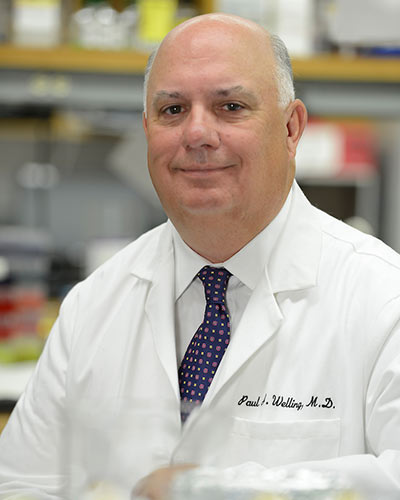January 08, 2018 | David Kohn

Dr. Paul Welling Is Recognized for His Innovative Physiological Research
Paul Welling, MD, a professor of physiology at the University of Maryland School of Medicine (UMSOM), along with his collaborators from around the world, have been awarded a prestigious Transatlantic Network of Excellence grant from the Foundation LeDucq to study why blood pressure is so sensitive to dietary potassium.
The award recognizes a distinguished scientist who has made major contributions to understanding physiological processes through innovative research.
The Foundation Leducq, which has headquarters in Paris and Boston, focuses on improving human health through international efforts to combat cardiovascular and neurovascular disease. By forging scientific alliances that transcend national borders, and educating young researchers who thrive in an international context, the organization aims to promote innovation in cardiovascular and neurovascular research, allow researchers to benefit from an efficient use of resources, and develop long term collaborative relationships.
Dr. Welling’s work has transformed the understanding of potassium balance, and have provided an explanation for the protective effects of dietary potassium on blood pressure.
Hypertension is the greatest contributor to premature death and disability in the world. High dietary salt consumption is a key culprit, but growing evidence indicates that low potassium consumption has an equally important role. The mechanisms underlying the effects of potassium, and the implications for prevention and treatment of hypertension, remained obscure, until the Welling and his collaborators helped define a pathway, which they call the renal potassium-switch. Their work indicates that low potassium consumption, common in modern diets, causes the body to conserve potassium, which leads to increased sodium retention and higher blood pressure.
“Dr. Welling has led the way in helping to unravel the relationship between potassium, sodium and blood pressure,” said Scott Thompson, PhD, professor and chair of the UMSOM Department of Physiology. “He continues to do groundbreaking work with his innovative research.”
Dr. Welling, who is also director of the Maryland Center for Kidney Discovery, has earned international recognition as a leading expert on the molecular mechanisms of renal potassium balance. His laboratory is recognized for elucidating how ion transport molecules in the kidney control electrolyte balance, and for discovering how these molecules go awry in disorders of salt regulation and blood pressure. In his latest work with potassium, his laboratory employs a multidisciplinary approach that includes gene discovery, genomic approaches, in vitro models, genetically engineered mouse models and translational studies in humans.
The researchers in the network will work together better understand the role of this new pathway in humans. One key goal is to identify and study new targets in the pathway that could be exploited to develop new blood pressure drugs. Dr. Welling’s lab will delineate the molecular, structural and physiological basis of the pathway using genetically engineered mouse models.
Dr. Welling will be the North American coordinator of the network, and UMSOM will be the administrative center. The other principal investigators in the group are Olivier Staub, PhD, University of Lausanne in Switzerland; Eric Delpire, PhD, Vanderbilt University Medical Center; David Ellison, M.D., Oregon Health & Science University; Robert Fenton, PhD, University of Aarhus in Denmark; and Michael Stowasser, PhD, University of Queensland in Australia.
“Prof. Welling deserves this top international honor,” said Dean E. Albert Reece, MD, PhD, MBA, who is also the University Executive Vice President for Medical Affairs and the John Z. and Akiko K. Bowers Distinguished Professor and Dean, of the University of Maryland School of Medicine. “His work on potassium and hypertension has the potential to move from bench to bedside, and as a result improve millions of lives around the globe.”
About the University of Maryland School of Medicine
Commemorating its 210th Anniversary, the University of Maryland School of Medicine was chartered in 1807 as the first public medical school in the United States. It continues today as one of the fastest growing, top-tier biomedical research enterprises in the world -- with 43 academic departments, centers, institutes, and programs; and a faculty of more than 3,000 physicians, scientists, and allied health professionals, including members of the National Academy of Medicine and the National Academy of Sciences, and a distinguished recipient of the Albert E. Lasker Award in Medical Research. With an operating budget of more than $1 billion, the School of Medicine works closely in partnership with the University of Maryland Medical Center and Medical System to provide research-intensive, academic and clinically-based care for more than 1.2 million patients each year. The School has over 2,500 students, residents, and fellows, and nearly $450 million in extramural funding, with most of its academic departments highly ranked among all medical schools in the nation in research funding. As one of the seven professional schools that make up the University of Maryland Baltimore campus, the School of Medicine has a total workforce of nearly 7,000 individuals. The combined School and Medical System (“University of Maryland Medicine”) has an annual budget of nearly $6 billion and an economic impact in excess of $15 billion on the state and local community. The School of Medicine faculty, which ranks as the 8th-highest public medical school in research productivity, is an innovator in translational medicine, with 600 active patents and 24 start-up companies. The School works locally, nationally, and globally, with research and treatment facilities in 36 countries around the world. Visit medschool.umaryland.edu/
Contact
Office of Public Affairs
655 West Baltimore Street
Bressler Research Building 14-002
Baltimore, Maryland 21201-1559
Contact Media Relations
(410) 706-5260
Related stories

Thursday, June 29, 2017
University of Maryland School of Medicine Scientist Receives Top Award for His Work on the Relationship Between Potassium and Blood Pressure
Paul Welling, MD, a professor of physiology at the University of Maryland School of Medicine (UM SOM), has been named the 2017 Carl W. Gottschalk Distinguished Lecturer of the American Physiological Society. The award recognizes a distinguished scientist who has made major contributions to understanding physiological processes through innovative research.
